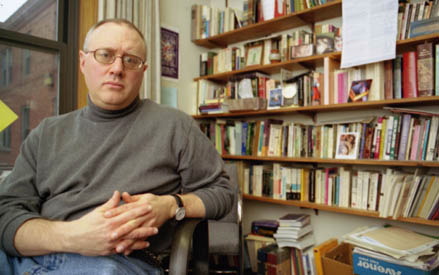What Light: This Week’s Poem: D. E. Green
"What Light: This Week's Poem," sponsored by Magers and Quinn Booksellers, brings you a poem every week by a Minnesota poet, selected by a panel of writers and publishers. Look for the new anthology of What Light poets at Magers and Quinn.

Because It Hath No Bottom
The prophet called
but didn’t leave a number.
Oh, in the beginning was the word,
but the word has splayed flesh:
Blessed art thou among women
and blessed is the fruit of thy whom
wot maykes it so difficoo(l)t
to get a dite on Satteday night—
even in Siloa’s valley or on Parnassus’ epic crags.
Put out the light and then put out the light
or the light will be the death of us,
the first curse, the “let there be”
that wouldn’t let it be,
the kick of consciousness, the sting
of conscience, light from light,
true god from true god begotten,
but made, for nothing will come
of nothing, just virgins and angels
that keep holy the sabbath, that do not
take the name of the lord hither or yon,
beyond range of the signal, the sign,
we would have some sign—for we shall not be
eased till we be nothing short of
nothing.
Why have you forsaken
us? Left us with few talents, prodigal
children all, fatted calves with no sacrifice
to attend to, except to suffer the little children
through the eye of a rich man’s needle?
You laugh, but it’s that hard—Shhhh! I tell only
the hawk or the handsaw, in whom silence is
an excellent thing.
But music is a rare
brooch in this all-hating world.
A siren’s song to dash us upon the rocks,
to ground us on the shallows of desire.
Panting for divinity. And yes, yes, yes, yes,
I will.
But why? Etherized like satan, patient
at table, awaiting endlessly the end, tomorrow
and tomorrow and Tuesday next, the big sale day,
the big discount, priceless, the priceless pearl—
peerless, without number.
Poetics
“Because It Hath No Bottom” grew out of an encounter between Shakespeare and Ginsberg. On 21 November 2007, during an unseasonably warm, sunny lunch-hour, several colleagues and I celebrated the 50th anniversary of the publication of Allen Ginsberg’s “Howl” with an impromptu reading in Augsburg’s quad. I got a bit carried away delivering the Moloch section of the poem. A colleague in Psychology, escorting a potential donor across campus, had to explain that I was really a very mild-mannered English professor—not a potential terrorist. Afterwards, I went off to my Shakespeare class. In the evening, I re-read Bottom’s famous synesthetic speech about his “most rare vision.” Not long after that conjunction of “Howl” and Midsummer Night’s Dream, this week’s poem was born.
Biography
D. E. Green teaches English at Augsburg College. Back in the late Seventies and early Eighties, he studied Renaissance drama and literature at Brown University but has been all over the map since. His most recent passions are contemporary criticism, contemporary drama in English, and writing poetry and creative nonfiction. But he hasn’t given up on Shakespeare, Dickinson, and Wilde. Green has published scholarly articles and reviews in Shakespeare Quarterly, Upstart Crow, and Shakespeare Bulletin. His poems have appeared in Augsburg’s Murphy Square, Sidewalks, and Rag Mag and online at Three Candles and in the Northfield Arts Guild’s Writers’ Night series. He enjoys reading novels aloud and going to the movies—both art films and pop trash. He lives in Northfield, MN, with his partner Becky Boling, who teaches Spanish at Carleton College, and their son Zach.
 >
>